In 2019, I got to travel to Greece twice. I came back with tons of souvenirs and the kind of burning passion for Greek mythology that I haven’t felt since I was a kid. Combined with a love for retellings of all kinds, I’ve ah… gotten a little intense with my reading over the past year. (To the point that I had to do actual deductive reasoning to figure out which book had this really fun interaction between Odysseus and Helen I was thinking of…) So this post is for organising my thoughts and sharing my findings with all of you: a big round-up of recs for various Greek mythology-inspired media! …Part One, because it ended up being longer than I anticipated!
Side note: as this is an SFF blog, all media discussed below have an SFF element. (I’ll take this moment to say that even though they’re non-SFF, reading Sophocles’ Antigone and following it up immediately with Kamila Shamise’s modern UK-set retelling Home Fire is pretty interesting.) A lot of the time, the “SFF element” is the presence of Greek gods. My apologies to Hellenic reconstructionists.
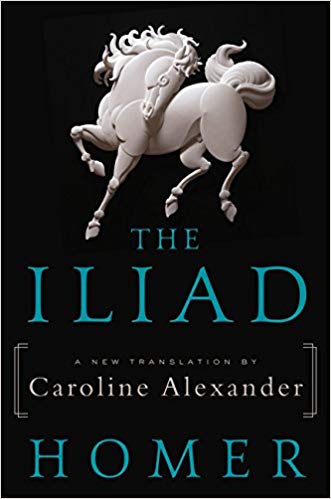
Alright, first let’s get the classics out of the way. I found the Odyssey absolutely fantastic, but am struggling my way through the Iliad. The difference comes down to a few things. The Odyssey‘s various episodes (the cyclops, Circe, Charybdis and Scylla, etc.) are pretty well known and often referenced by other media. It’s a ton of fun to see them play out “straight” and in detail. The Iliad also features plenty of memorable scenes (though the Trojan Horse doesn’t actually appear), but a lot of it is just dull surprisingly play-by-play. He hits him and then he hits him but then he hits him so then… Okay, it’s a war, I get it.
There’s also the matter of which version to choose. I got both as audiobooks because hey, that’s the 21st century equivalent of oral epic poetry traditions, right? I highly recommend the Robert Fagles translated Odyssey – it’s narrated by Sir Ian McKellen!! He does a lovely job; I had an earworm of the epic’s oft-repeated set phrases (“sandy Pylos”, “bright-eyed Athena”, “god-like whoever”) in his particular cadence stuck in my head for days. Caroline Alexander’s translation of the Iliad is also great, but the narrator just doesn’t compare.
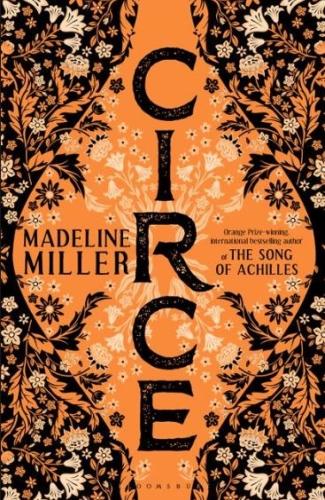
If 800 BC is a little too classic for you, there’s Madeline Miller’s “modern classics”: The Song of Achilles and Circe. The former is a retelling of the Iliad focused on the love story between Achilles and Patroclus; the latter is a feminist exploration of Circe (“the nymph with lovely braids”), who’s best known for turning Odysseus’ sailors into pigs. The prose in both is gorgeous enough they’re worth reading just for that, and Miller’s interpretations of the familiar characters is interesting.
Unfortunately, I… am either neutral towards or actively dislike practically everything else about the books. As everyone in a 200km radius of me knows, I have a lot of Thoughts about Circe‘s take on feminism. I was underwhelmed by the central romance in The Song of Achilles but was okay with the book until the ending. Spoilers for a near 3000 year old poem: Patroclus dies before Achilles, but he’s the book’s narrator and the book doesn’t end with his death. The way Miller handles that final bit felt so exceedingly, infuriatingly soppy to me, I ended up laughing in disbelief. However, basically all my friends love these books, so what do I know?
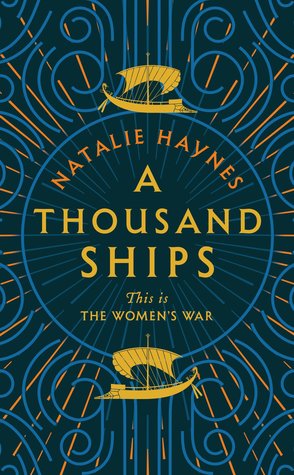
Staying on the topic of Iliad/Odyssey retellings, there are two that I recommend whole-heartedly: The Trojan War Will Not Take Place by Jean Giraudoux (also translated into English as Tiger at the Gates) and A Thousand Ships by Natalie Haynes. TTWWNTP is a play about Hector of Troy’s desperate attempts to avoid war with the Greeks after his brother steals Helen. It was written between the two World Wars and its fervent anti-war message is moving and thought-provoking. A Thousand Ships is one of the 2018/19 trifecta of Feminist Hot Takes On The Iliad (the others being Circe and Pat Barker’s Silence of the Girls, which I haven’t gotten to yet). It’s a collection of snippets from the perspective of various female characters from the epics, illuminating oft-forgotten minor characters. I really appreciated the broad range of voices; Haynes portrays many different types and fates of women sympathetically. Side-note: this is the book with the really fun Helen-Odysseus interaction.
Okay, one last Iliad-inspired thing! House of Names by Colm Tóibín provides a more nuanced look at the story of Clytemnestra, the wife of the Greek king Agamemnon who promptly murdered said king when he returned home from Troy. It’s lovely. It’s also only barely SFF and in my opinion, would have actually been (even) better without that touch of fantasy, but there you go.
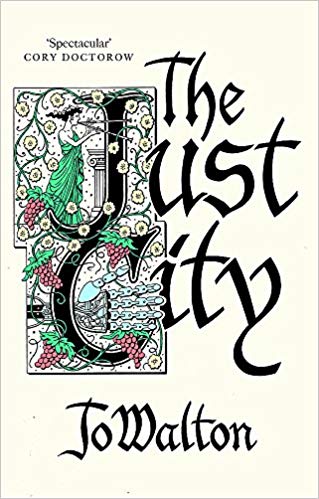
Another almost-purely-historical book I adore is Mary Renault’s The King Must Die. It retells the story of Theseus, most famous for killing the Minotaur. The fantastical element here is small: Theseus can sense earthquakes before they happen. Renault works really hard to recreate the society and morality of Ancient Greece (according to historical research of her time, much of which is admittedly out-of-date by now) and the result is thoroughly absorbing. The book also features Cretan bull-leaping (!!!).
The Just City by Jo Walton also contains grey morality, but here it’s very much brought into focus. The premise is that the goddess Athena decides to conduct an experiment: try to follow Plato’s guidelines to create the perfect just Republic. Of course, the immediate questions is, “What is just?” The book functions as a kind of extended Socratic dialogue. But unlike the few Socratic dialogues I’ve read (which I found straight-up infuriating) I thought the book worked really well. It’s part easy introduction into Ancient Greek philosophy, part scathing critique thereof, and part thoughtful, modern update to thousand-year-old topics.
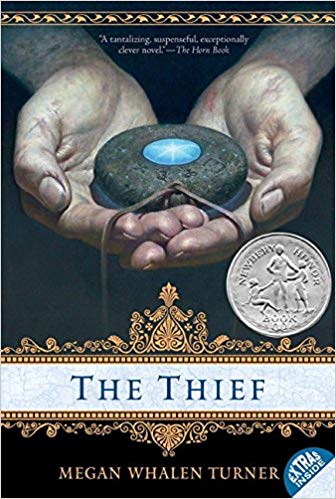
And now that everyone who hates litfic has backspaced out of here, let’s round off the roundup with two fun Greek-myth-themed YAs. Alexandra Sheppard’s Oh My Gods follows in the footsteps of Percy Jackson. The heroine is a 21st century British girl who faces all the typical problems of teen girls: navigating friendship, her first kiss, her sister aka the goddess Aphrodite turning her hair green… The book peters out a bit in the second half, but overall it’s silly and adorable in the best ways. (Side-note: I haven’t read the Percy Jackson series in like a decade but I assume that’s still great too.)
The Queen’s Thief series by Megan Whalen Turner is the only one on this list that’s only inspired by Greek mythology but I just couldn’t leave it off! Each book can work as a stand-alone, but it broadly follows Magnificent Bastard Eugenides’ rise from thief to… well, saying more would be a spoiler. The first book in the series is cute, but for younger audiences than the rest. I started with book 3, The King of Attolia (and it remains my favourite in the series), so definitely feel free to jump in anywhere that sounds appealing.
To be honest, this is only about half of what I wanted to cover, but the post is getting pretty long, so let’s end it here for now! Have you ready any of these books? Do you have any recommendations for me? (As you can tell, I’m always looking for more…) Part two, including non-novel media recs, coming soon!

You should try Stephen Fry’s ‘Mythos’ and ‘Heroes ‘, great modern retelling of the Greek myths.
I reservedly recommend The Firebrand by Marion Zimmer Bradley as a well written, feminist retelling of the Trojan War. If, given recent revelations about her, you can do the death of the author thing with MZB.
I just stumbled on your content this afternoon. Good stuff!
I’m just reaching out because I recently published a content Lovers’ Legends: The Gay Greek Myths that might be a good fit https://www.academia.edu/4913986/Lovers_Legends_The_Gay_Greek_Myths.
Keep up the good work!